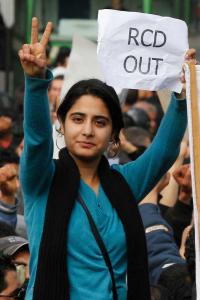Africa
Statements from the Socialist Party of Malaysia, Partido Lakas ng Masa (PLM, Party of the Labouring Masses) Philippines, Socialist Alliance (Australia), Labor Party Pakistan and Socialist Aotearoa.
* * *
Socialist Party of Malaysia solidarity statement with the People's Uprising in Egypt, Tunisia and the Middle East
Olivier Besancenot on Tunisia: `I know now that revolution is possible'

Photo: Photothèque Rouge/Akremi Mesbah.
January 26, 2011 -- Collective Resistance -- Olivier Besancenot, spokesperson for the Nouveau Parti Anti-Capitaliste, was in Tunisia earlier this week to find out about the revolution happening there. Here are his impressions.This interview first appeared in French on the NPA website. The translation by the Collective Resistance blog appeared on January 26.
* * *
How did this trip to Tunisia come about?
Sudan: Why the people of the south voted for independence

By Kerryn Williams
Tunisia: Masses create people's power bodies in neighbourhoods and workplaces

Demonstration against RCD ministers, January 19. Photo by Nasser Nouri.

[For more on Tunisia in revolt, click HERE. Scroll down for earlier reports and analysis. ]
UGTT demands dissolution of 'unity government'
Statement of the National Administrative Commission of the General Union of Tunisian Workers (UGTT) issued on January 21, 2011 (first published in English on MRZine).
1. The General Union of Tunisian Workers is a national organisation necessarily interested in political affairs, given its history of struggle during the colonial epoch and the period of the construction of the modern state, considering the dialectical links among economy, society, politics, and culture in the process of development, but out task has become more urgent than ever.
(Updated Jan. 16) Tunisia's intifada topples tyrant: 'Yezzi fock!'

[For more on Tunisia in revolt, click HERE.]
On January 14, the BBC reported that the mass uprising in Tunisia had toppled that country's Western-backed tyrant after weeks of protests and government repression, which has cost the lives of dozens of Tunisians. According to the BBC:
Tunisia's President Zine al-Abidine Ben Ali has stepped down after 23 years in power, amid widespread protests on the streets of the capital Tunis. In a televised address, Prime Minister Mohammed Ghannouchi said he would be taking over from the president. A state of emergency was declared earlier, as weeks of protests over economic issues snowballed into rallies against Mr Ben Ali's rule. Unconfirmed reports say Mr Ben Ali and his family have left Tunisia. The reports suggest that the deposed president is looking for a place of asylum, with French media saying that French President Nicolas Sarkozy has turned down a request for his plane to land in France.
The articles below explain some of the background to the uprising.
Ivory Coast: Behind the post-election political crisis and threat of military intervention
Ivorians protest against food price increases in 2008.
By Peluola Adewale
Jannuary 5, 2011 -- Democratic Socialist Movement (Nigeria) -- That the November 28, 2010, run-off election in the Ivory Coast has produced two presidents – Alassane Ouattara and Laurent Gbagbo – is not a surprise, though working people had expected the election to usher a return of peace. The country has been divided into two since the 2002 coup attempt and subsequent rebellion, with each half effectively having its own de facto government. The north is controlled by rebels, Forces Nouvelles (New Forces), while the south is under Gbagbo with the support of the armed forces and youth militia. Therefore, on this account and with the ethnocentric sentiment that has characterised Ivorian politics in the last two decades, it is natural that the results of the election from either half would be bitterly disputed by the party declared the loser of the contest.
US warplanes take off from Diego Garcia.
[Read the Mauritian socialists' open letter to Greenpeace -- `Don't help cover up colonialism's crimes on Diego Garcia' HERE, warning the organisation that it is being manipulated by the US and British governments. This has now been confirmed by Wikileaks.]
By Clency Lebrasse
December 17, 2010 -- Rabble.ca -- Six months ago, I wrote a piece for rabble.ca describing the appalling treatment of the people of the Chagos Islands [which includes Diego Garcia] in the Indian Ocean by the British government.
South Africa: `COSATU has waged titanic battles' -- COSATU marks its 25th anniversary

Workers celebrate COSATU’s 25th anniversary. Picture: Gallo Images.
The following speeches, by COSATU's president and general secretary, were delivered at a ceremony in Johannesburg on December 3, 2010, to celebrate the Congress of South African Trade Unions' 25th anniversary.
* * *
By Sidumo Dlamini, COSATU president
December 3, 2010 -- Cyril Ramaphosa was prophetic when he declared that “a giant has arisen!” That giant has grown from 130,000 members when it was launched to well over 2 million paid up members today.
While still barely walking, the young giant launched itself into titanic battles against employers and the apartheid regime. In his speech at the launch, founding COSATU president Elijah Barayi gave apartheid ruler P.W. Botha a six-month deadline to do away with passes. Indeed Botha succumbed and the hated pass laws that had humiliated millions for decades were scrapped. Today we carry proper identity documents.


